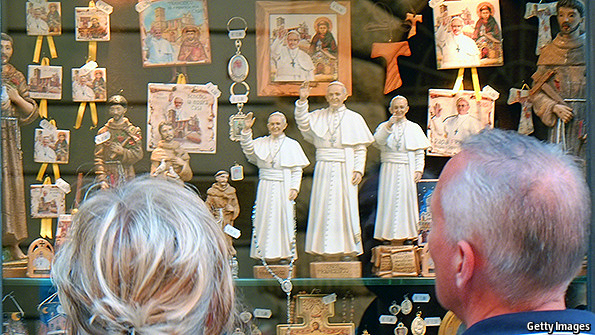Prudent but not puritan
http://www.economist.com/blogs/erasmus/2014/12/religion-and-spending
Dec 1st 2014, 11:24 BY P.G. AND B.C.

IF DEVOUT folk, and Christians in particular, take their faith as seriously as they claim to, then you would expect it to have a big impact on the way they spend money. That was the assumption that Vince Showers, a finance professor and specialist in econometrics at Bradley University, Illinois, set out to test. To see what sort of behaviour might be expected, he and four fellow researchers looked at passages in the New Testament which appear to offer some guidance: for example, verses that urge people to take good care of their bodies, look after their families, avoid getting into debt and eschew vain adornment.
After using a lot of fancy statistical tools, they came up with some expected findings, and some rather unexpected ones. Households "with a strong commitment to faith"— demonstrated by higher spending on religious activities—are less likely to be weighed down by excessive mortgage outgoings or loan payments for cars. Compared with other households, they are more likely to be home owners but their property tax burden tends to be less—suggesting that "some moderation in [the] selection of home in terms of extravagance or location...."
Devout households seem keener on mitigating risk and therefore spend more on life insurance and health insurance; they lay out less on alcohol and tobacco and more on domestic appliances, including cooking utensils. Such homely behaviour is most heavily correlated with religious belief in the American South and Midwest, which are also the regions with "the most conservative interpretation of scripture," Mr Showers notes, in an article in the Interdisciplinary Journal of Research on Religion. (The research more-or-less conflates the term "religious" with "Christian" or "Judeo-Christian" which in the American context is only a smallish distortion.)
But religious families do allow themselves some earthly pleasures. Indeed, they are if anything a little more likely than other households to spend spare money on clothing or jewellery, although the amount each household splurges on jewellery is a bit less. Some of that jewellery, of course, might be devotional: silver crosses or stars of David. They are as likely as anybody else to be spending money on child support or alimony—a proxy for failed marriages—and they are as inclined as other folk to incur interest payments on credit cards.
more at link
